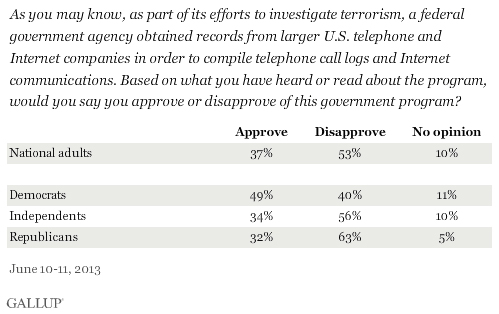Americans only care about spying when the other party does it
Flip-flopping: A national pastime

A free daily email with the biggest news stories of the day – and the best features from TheWeek.com
You are now subscribed
Your newsletter sign-up was successful
In 2006, Democrats were incensed by the idea of the Bush administration snooping on them in the name of fighting terrorism. When asked whether it was "acceptable" for the NSA to have access to phone records, only 37 percent said yes, according to a Washington Post-Pew Center poll, while Republicans stood behind George W. Bush at 75 percent.
What a difference a president makes. On Tuesday, a poll asking almost the same question found the numbers switched: 64 percent of Democrats approved of the NSA's actions while only 52 percent of Republicans did. Gallup found a similar partisan split:

(Gallup)
The Week
Escape your echo chamber. Get the facts behind the news, plus analysis from multiple perspectives.

Sign up for The Week's Free Newsletters
From our morning news briefing to a weekly Good News Newsletter, get the best of The Week delivered directly to your inbox.
From our morning news briefing to a weekly Good News Newsletter, get the best of The Week delivered directly to your inbox.
These poll results seem to indicate that Americans care more about condemning the opposing party than protecting privacy. And considering today's hyper-partisan political landscape, that's easy to believe. Even the White House, which has ardently defended the NSA's surveillance program, seems to have switched sides on the issue since the Bush administration:
Other reasons might exist to explain why some Americans have changed how they feel about the NSA collecting phone records. The outcome of a couple of polls isn't conclusive evidence that partisanship is to blame. Juliet Lapidos of The New York Times noted that 2006 and 2013 are very different eras:
1. In 2006, Americans were reacting to news that the government had not bothered to obtain court approval prior to tracking calls. Now the government loops in the courts. Democrats might think that judiciary involvement makes all the difference.
2. 2006 was, obviously, much closer in time to the September 11 attacks. Maybe Republicans who have switched sides think of N.S.A. surveillance as an emergency measure that's no longer justifiable.
3. Democrats may feel that if the Obama administration has decided to continue a Bush-era program, that must mean it's really necessary. That's not hypocrisy, exactly, more like a matter of trust/mistrust in leadership. [New York Times]
Americans are also split on whether Edward Snowden was right or wrong to leak classified information to The Guardian and The Washington Post, with 49 percent of Republicans supporting his actions compared to only 39 percent of Democrats. One thing members of both parties agree on? That the press was right to publish the information given to them.
A free daily email with the biggest news stories of the day – and the best features from TheWeek.com
Keith Wagstaff is a staff writer at TheWeek.com covering politics and current events. He has previously written for such publications as TIME, Details, VICE, and the Village Voice.
-
 The week’s best photos
The week’s best photosIn Pictures An Andean god, a rogue squirrel, and more
-
 ‘Zero trimester’ influencers believe a healthy pregnancy is a choice
‘Zero trimester’ influencers believe a healthy pregnancy is a choiceThe Explainer Is prepping during the preconception period the answer for hopeful couples?
-
 AI surgical tools might be injuring patients
AI surgical tools might be injuring patientsUnder the Radar More than 1,300 AI-assisted medical devices have FDA approval